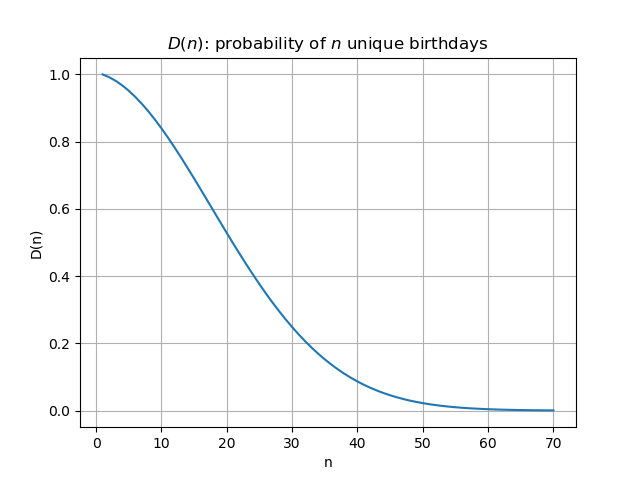#P40006. 2019 ICPC NCNA Regional Contest G - Birthday Paradox
2019 ICPC NCNA Regional Contest G - Birthday Paradox
题目描述

The Birthday Paradox is the name given to the surprising fact that if there are just 23 people in a group, there is a greater than
Consider what we might observe if we randomly select groups of P=10 people. Once we have chosen a group, we break them up into subgroups based on shared birthdays. Among many other possibilities, we might observe the following distributions of shared birthdays:
- all 10 have different birthdays, or
- all 10 have the same birthday, or
- 3 people have the same birthday, 2 other people have the same birthday (on a different day), and the remaining 5 all have different birthdays. </ul> Of course, these distributions have different probabilities of occurring.
Your job is to calculate this probability for a given distribution of people sharing birthdays. That is, if there are P people in a group, how probable is the given distribution of shared birthdays (among all possible distributions for P people chosen uniformly at random)?
输入格式
The first line gives a number where . The second line contain integers through , where for all . The value represents the number of people who share a certain birthday (and whose birthday is distinct from the birthdays of everyone else in the group).
输出格式
Compute the probability of observing a group of people with the given distribution of shared birthdays. Since may be quite small, output instead . Your submission's answer is considered correct if it has an absolute or relative error of at most from the judge's answer.
样例
输入样例1
2 1 1输出样例1
-0.001191480807419输入样例2
7 1 1 2 1 3 1 1输出样例2
-4.310614508857128数据范围与提示
The first sample case shows people with distinct birthdays. The probability of this occurring is , and .
The second sample case represents the third example in the list given earlier with people. In this case, the probability is , and .
